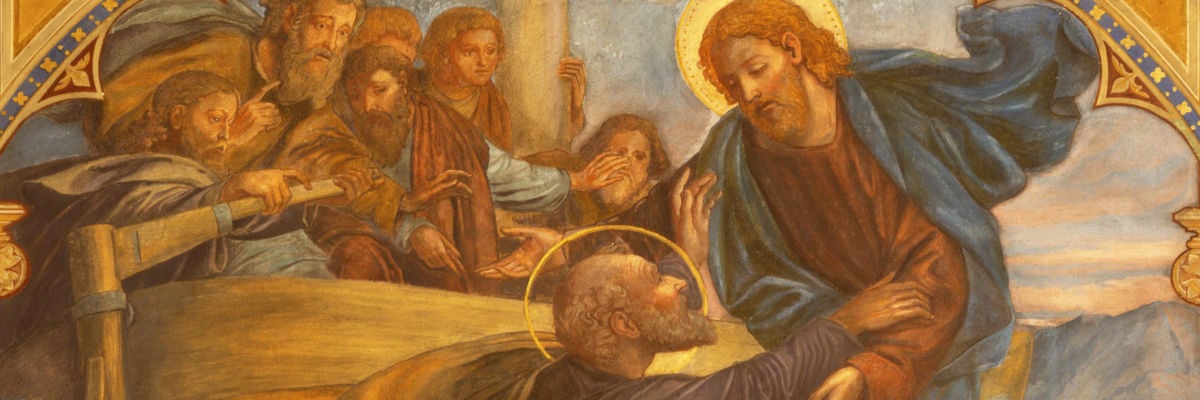
Homily for the Nineteenth Sunday in Ordinary Time, Year A
At the mountain of God, Horeb,
Elijah came to a cave where he took shelter.
Then the LORD said to him,
“Go outside and stand on the mountain before the LORD;
the LORD will be passing by.”
A strong and heavy wind was rending the mountains
and crushing rocks before the LORD—
but the LORD was not in the wind.
After the wind there was an earthquake—
but the LORD was not in the earthquake.
After the earthquake there was fire—
but the LORD was not in the fire.
After the fire there was a tiny whispering sound.
When he heard this,
Elijah hid his face in his cloak
and went and stood at the entrance of the cave.-1 Kings 19:9a, 11-13a
Every day for more than a millennium, the Church has begun her daily round of prayer with the words “O Lord, open my lips” and then sung Psalm 95 (or 94 for the Latin and older English versions of the Bible). The psalm begins “Come, let us adore the Lord.” Toward the end, we hear, “If today you hear his voice, harden not your hearts.”
Often is it hard for us to hear the Lord’s voice; or if we do, it is hard to keep paying attention, especially if things get difficult or stressful.
God gets Elijah’s attention today, first by heavy winds, then by an earthquake, and then by fire, but Elijah finds that these signs do not contain the prophetic message he was awaiting. Instead, he finds God’s presence in a “still, small voice” or as our translation tells us, a tiny whispering sound. He then enters the darkness and the silence of the cave to hear the voice of the Lord. A dialogue then begins (not included in today’s passage) between Elijah and the Lord.
The experience of the holy prophet Elijah, patron of souls seeking a life of prayer, shows us the process of prayer and of entering into prayer as we too experience it. The challenges of life—looming disasters, disappointments, dread, regrets—get our attention, and it occurs to us that we should pray. We have a hard time finding the Lord in these troubling events both within and outside of us, and so we seek the cool quiet of prayer so as to be able to find the Lord’s presence and hear his voice and respond to him.
St. Peter’s experience is very similar: the fearsome stormy sea, the consoling and hopeful thought of the Lord’s presence in the midst of the storm, and then after a moment of consolation, the return of fears and doubts. At this point, all that Peter can do is cry out in prayer, “Lord, save me!” and he does. He lifts the apostle out of the water and they are back safely in Peter’s barque.
The stormy sea, or, if you will the winds, shaking, and fire of our inner life is a very normal context of our prayer. Our unruly emotions, anger, fear, lust, sadness, despair, are like the roaring seas. It is Jesus who calmly and powerfully dominates all that, walking on the troubled waters of our soul, so deeply affected by the results of original sin and of our own personal falls. He invites us to join him in his place of power and peace, but our hearts grow momentarily hard and we almost don’t make it to him in persevering prayer. We run the risk of giving in to these passions and sinking beneath the waves of our feelings and imaginations. At this point there is only one thing we can do. Unable to calm our angers, fears, lusts, sadnesses, and discouragements, we have just enough strength to call to him, “Save me!”
Hardness of heart does not mean just that we are mean or unkind or unfeeling; it indicates rather that our passions and inner images are fixed and unmoving. We can’t get our minds off some slight or many slights we have received, or the lingering shame we have at our sins past and present, or the possible problems we will have in the near or distant future. We are stuck: our souls lack the flexibility to be motivated by brighter, better, more loving, forgiving, and confident thoughts.
Our Lord heard the constant prayers of the crowds in Galilee and Judea: “Son of David, have pity on me,” Lord have mercy.” He was moved by those prayers then and he is moved by them now. Calling out to be saved, praying “Lord, have mercy,“ or “Save us Savior of the World,” or “Most Holy Mother of God, save us” is the most basic form of Christian prayer. The kyrie eleison we hear repeated at each Mass, and which many repeat over and over again in the “Jesus Prayer” (which is taught in the Catechism as an ancient tradition of prayer)… these prayers sum up in as few words as possible the most basic and profound sense of all prayer.
Before all else, we need God’s mercy, we need the promise of salvation, we need the help of the citizens of heaven. Even if our prayer is joyful and easy from time to time, this is because God and his Holy Ones are helping us, taking us by the hand, and lifting us from the troubled waters of our weak human nature with its inconstant needs and worries.
It is ultimately the love of Jesus and his friends that brings about our safety from the sea of our passions. We must cry out constantly and hopefully for that. This is a matter of perseverance. Just as we are always and daily subject to temptation, so we should always and daily ask for the help and mercy of the Savior as we go about our business
There is an old Protestant hymn that expresses this truth, the words of which we borrow:
I was sinking deep in sin,
far from the peaceful shore,
very deeply stained within,
sinking to rise no more;
but the Master of the sea
heard my despairing cry,
from the waters lifted me;
now safe am I.Love lifted me!
Love lifted me!
When nothing else could help,
Love lifted me.
Love lifted me!
Love lifted me!
When nothing else could help,
Love lifted me.



